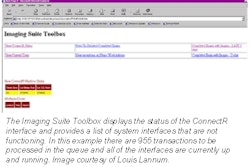SALT LAKE CITY - Should radiology or the hospital IT department control PACS? Not surprisingly, it depends on who you talk to.
With PACS increasingly reaching out of the radiology department and into the rest of the healthcare enterprise, this long-running question has become even more acute. In an effort to reconcile the opposing factions, SCAR hosted a debate today that brought together representatives from radiology and IT departments to discuss the merits of each approach.
The IT department should manage PACS for several reasons, said Guy Scalzi, vice president and account executive at FCG Management Services. PACS requires systems integration, not only with radiology information systems, speech recognition, and other clinical (IS) applications, but between the organization's local and wide-area network, he said.
"(LAN and WAN integration) is certainly the purview of the IT department," Scalzi said.
In addition, PACS has reached the point where it's just another application as part of the electronic medical record, he said. "At New York Presbyterian, for instance, we have over 300 applications, and PACS needs to integrate with many of them."
IT also has more experience in setting standards and dealing with vendors, he said.
"While radiology may deal with half a dozen vendors, IT deals with hundreds of IT vendors -- hardware and software -- and understands the relationship of contracting and negotiating," Scalzi said. "So in terms of setting standards for the vendors and for the technology, it's very important that IT be involved and have a great deal of control."
IT departments typically have more understanding than clinical departments of key matters such as security, disaster recovery, and network loads, he said. They also usually have more resources and skills to bring to bear on complex IT management issues, he said.
Of course, those arguments weren't particularly persuasive to some of the radiology representatives in attendance.
"If PACS is just another application, and it turns out that it's one within 300, I don't think I can be able to accept that," said Dr. Donald Harrington, chief of radiology at SUNY at Stony Brook, NY. "We should get some applications, such as security, and some of the compliance applications from them. (But) radiologists should be the ones that should be running and organizing the process, and (IT) should be supporting us."
PACS is a uniquely radiology-centric process, and much different than the routine IT processing of data, Harrington said. The IT department would need to be educated about these unique requirements before it would be able to handle that responsibility, he said.
Complicating the issue are wide variations in IT departments around the country, Harrington said.
"If you have a highly organized, well-funded IT department that's one thing," he said. "At Stony Brook, I have a very underfunded IT department, and they cannot provide those services. The radiologists need to be able to have the personnel, and the budget (necessary to support the PACS). PACS is a radiology offspring, and is better cared for in that environment."
The concept of 24/7 availability of PACS is something that had to be taught to his hospital’s IT staff, added Dr. Arvin Robinson, chief of radiology at the University of Rochester Medical Center. In addition, radiologists are typically more savvy and educated about the requirements of PACS.
"We have good IT people, but we're sitting here at SCAR, and going through all of these issues of PACS, and none of my IT people are here," Robinson said. "If they're going to be really involved with these images, they have to be part of the discussions."
Since radiologists have the most at stake, they should be the ones controlling the technology, said Dr. William Keyes, a radiologist with Inland Imaging of Spokane, WA.
"If my technology is slow, or is incompetent, it's not the IT department that's going to be sued for damages for delay of diagnosis, it's going to me," Keyes said. "It's radiologists that need to control this. They're the most at risk and have the most to gain."
By Erik L. Ridley
AuntMinnie.com staff writer
May 3, 2001
Click here to post your comments about this story in our PACS Digital Community. Please include the headline of the article in your message.
Copyright © 2001 AuntMinnie.com




















